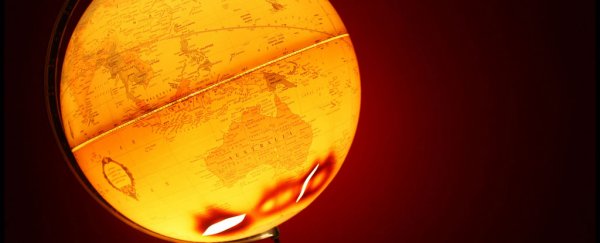The so-called global warming hiatus this century never actually happened, a new study has found, showing new evidence that the misperception of a 'slowdown' in the heating of Earth's oceans was due to a flawed interpretation of temperature data.
If this sounds familiar, that might be because a team of scientists at the US National Oceanic and Atmospheric Administration made the same case in a controversial 2015 paper – suggesting changes in measurements meant we'd been misreading how hot the oceans actually were between 1998 and 2012.
Despite presenting peer-reviewed evidence, the researchers behind the 2015 study were met with a storm of controversy, and were even subpoenaed to give evidence about their research, amid accusations they had altered their data.
Now, that earlier research has been vindicated in a new study led by the University of California, Berkeley, which used independent data sources to show that the NOAA conclusions were in fact sound.
The study also confirms that – as truly inconvenient as it is – the evidence suggests there has been no slowdown in global warming since 1998.
"Our results mean that essentially NOAA got it right, that they were not cooking the books," says researcher Zeke Hausfather.
So where did the whole concept of the pause in global warming come from then?
The concept originated after data collected from 1998 onward seemed to show that increases in the ocean surface temperature were slowing down – which many in the climate change denial camp took as evidence that global warming wasn't taking place to the extent that scientists had claimed.
The NOAA researchers argued that the perceived slowdown in ocean warming wasn't due to any physical or natural forces occurring on the planet, but was rather a result of an undetected bias in how we actually measure water temperatures.
That's because, for most of the 20th century, the primary way scientists measured ocean temperatures was using ship-based systems, but as technology progressed, more reliance got placed on measurements recorded by buoys, floating adrift at sea.
But something scientists didn't allow for as this transition occurred, was that buoys actually tend to report cooler temperatures than ships. This is thought to happen for a number of reasons, but the main factor is that water samples collected by ships can be inadvertently heated by ship systems such as engines and piping.
Unfortunately, by not correctly accounting for this 'cold bias' in increasing amounts of buoy-derived temperature data, it looked like ocean temperatures from 1998 on were less warm than they actually were – but it was a flaw in how we measured, not any kind of hiatus, the NOAA researchers argued.
To corroborate whether the 2015 study was right, Hausfather and fellow researchers looked at global buoy data, but they also took in two new sources of temperature measurements: satellite readings and robotic floats in the ocean.
To get away from any bias by incorrectly weighting one source against another, they looked at each measurement in isolation to see what it revealed about changing temperatures.
"Only a small fraction of the ocean measurement data is being used by climate monitoring groups, and they are trying to smush together data from different instruments, which leads to a lot of judgment calls about how you weight one versus the other, and how you adjust for the transition from one to another," says Hausfather.
"So we said, 'What if we create a temperature record just from the buoys, or just from the satellites, or just from the Argo [robot] floats, so there is no mixing and matching of instruments?'"
When they compared the results, it matched the NOAA data from 2015, suggesting the oceans have in fact generally continued to warm consistently with no hiatus – rising in temperature by 0.12 degrees Celsius per decade over the past two decades.
"Satellites and automated floats are completely independent witnesses of recent ocean warming, and their testimony matches the NOAA results," says another of the team, Mark Richardson from NASA's Jet Propulsion Laboratory and the California Institute of Technology. "It looks like the NOAA researchers were right all along."
For the team who were attacked for their 2015 paper, it's clearly satisfying to be vindicated by the new study.
"Given how rigorously we evaluated our [research], these results are not surprising but they are gratifying," Thomas Peterson, one of the NOAA authors, told Chris Mooney at The Washington Post.
As Hausfather points out, the recent record high temperatures in 2014, 2015, and 2016 make the argument for a global warming hiatus weaker than ever.
But as we head into the future and climate change continues to impact the world around us, the study shows that it's important to remember that sometimes our scientific assessments can and will be wrong – and we always need to be open to that possibility.
"We have to constantly be vigilant to potential biases in our understanding," Hausfather told Eva Botkin-Kowacki at The Christian Science Monitor. "There is no perfect measurement system, particularly over long periods of time."
The findings are reported in Science Advances.
